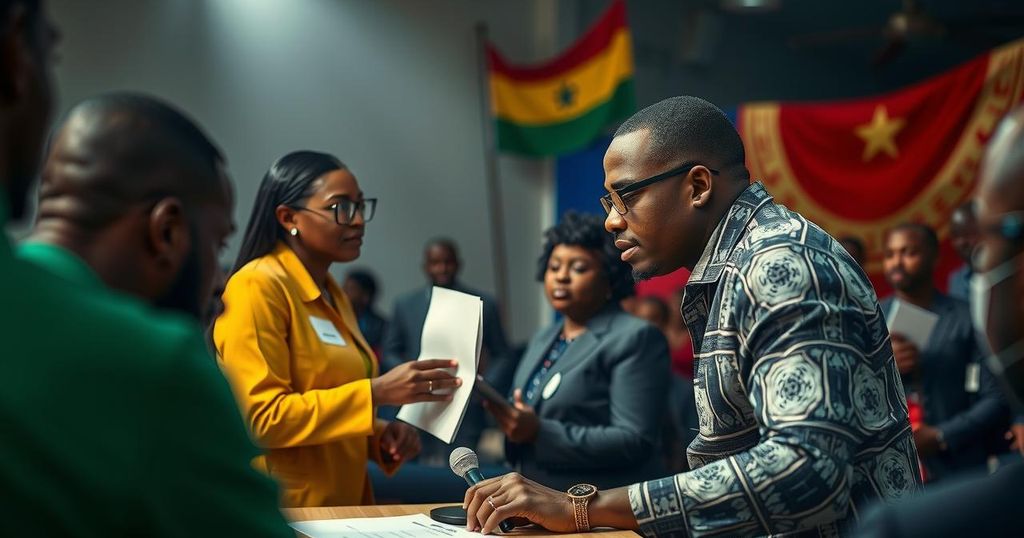Ghana’s December 7 elections are set to be highly competitive, with former President John Mahama challenging ruling party candidate Vice President Mahamudu Bawumia. Economic issues dominate voter concerns, particularly following the country’s recent $30 billion debt default. As dissatisfaction with the traditional two-party system grows, independent candidates like Nana Kwame Bediako emerge, adding complexity to the electoral landscape. The outcome may significantly impact governance and economic recovery efforts in Ghana.
The upcoming presidential election in Ghana, scheduled for December 7, is shaping up to be a fiercely contested event. Former President John Mahama stands as a formidable contender against the ruling party’s candidate, Vice President Mahamudu Bawumia. Mahama has pledged to create a 24-hour business environment aimed at stimulating job growth and fortifying the economy as it recovers from a significant $30 billion debt default in 2022. In contrast, Bawumia emphasizes his commitment to strengthening the economy despite challenges resulting from post-COVID realities and internal pressures.
For decades, Ghana’s political landscape has been dominated by two main parties—the National Democratic Congress (NDC) and the New Patriotic Party (NPP)—and political analyst Kwame Asah Asante predicts that this dynamic will continue. Minor parties have historically struggled to garner substantial support, with Asante noting, “It’s the dominant parties; one of them is going to carry the day.” However, some voters express frustration with the lack of diversity in leadership and voice their desire for alternatives.
The election is characterized by vibrant campaigning across Accra, with billboards of various candidates populating the streets, igniting enthusiasm among voters. Some individuals are still undecided, citing a yearning for change from the two-party system. Angela Ofori, an undecided voter, stated, “Since 1992 to this year, we haven’t changed parties… we want [to] change to [a] different party so that we would see more improvements.”
Furthermore, a new candidate, Nana Kwame Bediako—known as Cheddar—has emerged as an independent contender, appealing especially to the youth. Although he envisions eco-friendly policies and aims to improve daily life for Ghanaians, he lacks the traction to significantly influence the election outcome, according to experts.
Ghana’s economic situation weighs heavily on the minds of voters this election cycle. The nation, a leading cocoa producer, is grappling with the repercussions of a $30 billion external debt default, exacerbated by the COVID-19 pandemic and the global grain supply disruptions stemming from the Ukraine war. Political analysts argue that issues such as infrastructure, health, education, and unemployment are paramount, but the economy remains a focal point. Asante remarked, “The economy will play an important role because it’s a bread-and-butter issue; we’ve seen time and again that anytime you have a very difficult economy, campaigning becomes difficult for the government of the day.”
These economic challenges have led some voters, like Wisdom Gavor and Janet Bawah, to reject the current government, advocating for Mahama’s return. Gavor emphasized the potential impact of a 24-hour economy on job creation, while Bawah lamented rising costs of living, stating, “The suffering is too much for us…we want a change in the system.”
In contrast, some supporters of Bawumia commend his administration’s digitization initiatives, which are believed to have modernized various government functions, thereby creating job opportunities. Supporter Ivan Duke praised these policies, expressing satisfaction with the ongoing changes. As economic conditions evolve, Taden observed that Bawumia’s efforts have garnered merit, noting, “Dr. Bawumia is called Mr. Digital because he did promise to digitize the Ghanaian economy and to some extent he has delivered on a lot of those promises.”
Overall, Ghana’s democratic stability in a region frequently disrupted by coups contrasts sharply with the high stakes of this upcoming election. Analysts anticipate a competitive race that could result in significant shifts in leadership, shaping the future direction of the nation’s policy and governance.
Ghana has maintained a stable democratic system since its transition to multiparty politics in 1992, primarily dominated by the National Democratic Congress (NDC) and the New Patriotic Party (NPP). The upcoming elections reflect not only the continuity of these dominant parties but also a growing discontent among the electorate regarding economic issues and governance. Voters express a desire for change amidst serious economic challenges, including rising inflation and debt, as well as environmental issues related to illegal mining activities. This election serves as a crucial test for both established parties and emerging candidates, with the potential to reshape Ghana’s political landscape.
The forthcoming presidential election in Ghana represents a critical juncture for the nation’s political landscape. With the economy at the forefront of voter concerns, the choices between former President Mahama and current Vice President Bawumia will significantly influence the future of governance. As voters express a desire for change amidst longstanding party dominance, the active participation of independent candidates adds an intriguing dynamic to the electoral process. Ultimately, the outcome of this election may alter Ghana’s trajectory in addressing pressing economic and social issues while contributing to the evolution of its democratic principles.
Original Source: www.voanews.com







